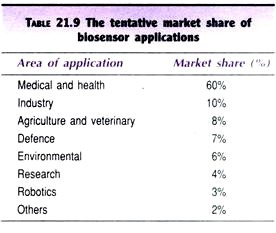This article throws light upon the four applications of biosensors. The four applications are: (1) Applications in Medicine and Health (2) Applications in Industry (3) Applications in Pollution Control and (4) Applications in Military.
Biosensors have become very popular in recent years. They are widely used in various fields. Biosensors are small in size and can be easily handled. They are specific and sensitive, and work in a cost-effective manner. The tentative market share of biosensor applications is given in Table 21.9. Some of the important applications of biosensors are broadly described hereunder.
1. Applications in Medicine and Health:
Biosensors are successfully used for the quantitative estimation of several biologically important substances in body fluids e.g. glucose, cholesterol, urea. Glucose biosensor is a boon for diabetic patients for regular monitoring of blood glucose. Blood gas monitoring for pH, pCO2 and pO2 is carried out during critical care and surgical monitoring of patients. Mutagenicity of several chemicals can be determined by using biosensors. Several toxic compounds produced in the body can also be detected.
2. Applications in Industry:
Biosensors can be used for monitoring of fermentation products and estimation of various ions. Thus, biosensors help for improving the fermentation conditions for a better yield. Now a days, biosensors are employed to measure the odour and freshness of foods. For instance, freshness of stored fish can be detected by ATPase. ATP is not found in spoiled fish and this can be detected by using ATPase. One pharmaceutical company has developed immobilized cholesterol oxidase system for measurement of cholesterol concentration in foods (e.g. butter).
3. Applications in Pollution Control:
Biosensors are very helpful to monitor environmental (air, water) pollution. The concentrations of pesticides and the biological oxygen demand (BOD) can be measured by biosensors. Several environmental pollutants can be evaluated for their mutagenicity by employing biosensors.
4. Applications in Military:
Biosensors have been developed to detect the toxic gases and other chemical agents used during war.
